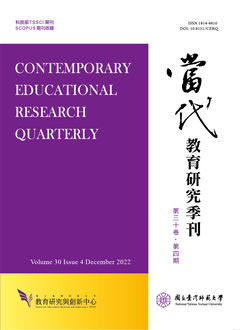

相對於傳統國家機關的統治思維,網絡治理途徑更具有分享決策權力、鼓勵公民自治及發展共同利益的特色。換言之,「治理」途徑指涉不同於傳統官僚與市場機制的網絡化治理結構,所有網絡成員間透過制度性的互動規則,相互影響與合作,達到共同治理的目標。<p>
而我國與日本之公立學校教師,因長期受到「特別權力關係」之影響,兩國主要教師組織──日本教職員組合(日教組)與中華民國全國教師會(全教會),均缺乏與英美國家教師組織相等之集體勞動權保障,但兩者卻大致仍能保持一定程度之政策影響力,凸顯兩者與政策網絡成員之互動關係與英美教師組織現況的差異,特別是日教組長期與執政勢力抗衡而不衰,更加反映出日本教育政策網絡參與者行為模式之獨特性,故本文擬以政策網絡之觀點,採取文獻分析、歷史比較等方法,針對日教組及全教會參與政策之機制與政策網絡成員互動規則與策略等事項,進行比較分析,以提供我國教育政策網絡治理模式未來發展之參考。
Relatively speaking, the network governance approach is more distinctive than traditional government thinking of the state on sharing decision power and urging the citizen's autonomy to develop common interests. In other words, network governance approach refer to the networking governance structure, differing from the traditional bureaucracy and market mechanism, and all network members get mutual impact and cooperation through interactive regulations for the target of cogovernance.<p>
However, because of the influence of ''special power relation'' for decades, the main teachers' organizations of public school in Taiwan (National Teachers' Association, NTA) and Japan (Japan Teachers' Union, JTU) had lacked collective labor rights unlike the teachers' organizations in England and U.S.A. But both NTA and JTU still hold policy influence to a certain degree and highlight the differences for interaction relation in both policy networks to the teachers' organizations in England and U.S.A., considering the JTU's experience for fighting against the ruling party in Japan which reflects the unique feature of participant's behavior in education policy network.<p>
Therefore, the goal of this article is to analyze the mechanism and interactive regulations of policy participation for the JTU and NTA, by using methods such as document analysis, historical comparison, from the view of policy network and expects to offer policy recommendations to government for adjustment in governance mode of education policy network.

本著作係採用創用 CC 姓名標示-非商業性 3.0 台灣 授權條款授權.
本刊國立台灣師範大學教育研究與創新中心
106台北市和平東路一段162號 | 電話: 02-7749-3670 | E-mail: cerecerq@gmail.com
教創中心 | 師大 | 電子報 | 線上投審系統
本刊由國家科學及技術委員會人文社會科學研究中心補助經費
© 2014 CERI-NTNU
